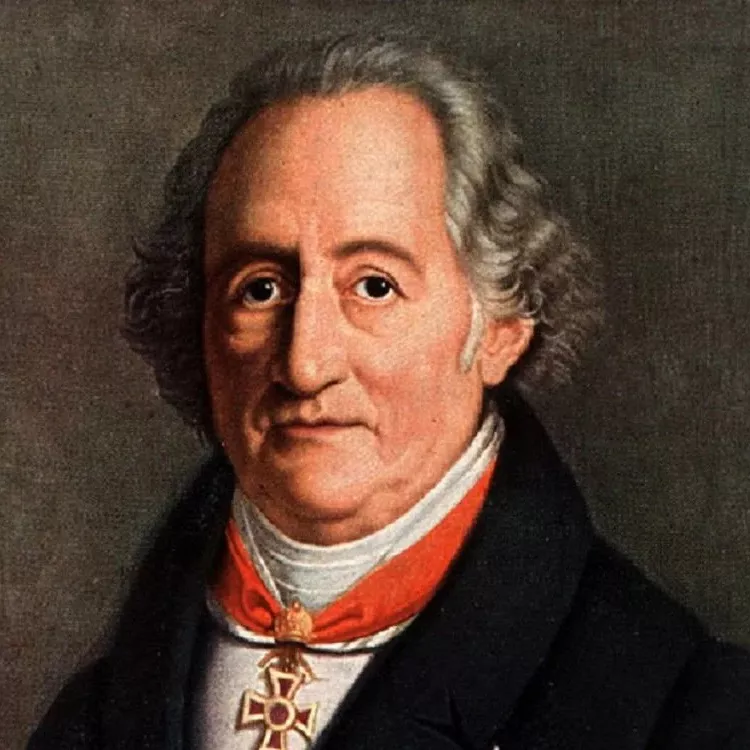
Johann Wolfgang von Goethe (1749–1832) was a German literary giant whose works embody the spirit of the Enlightenment and the Romantic era. Renowned for his masterful poetry, prose, and drama, Goethe’s influence extends beyond literature into philosophy, science, and the arts. His magnum opus, Faust, exemplifies his deep engagement with the human condition, making him a towering figure in cultural history.
Johann Wolfgang von Goethe Biography
Johann Wolfgang von Goethe was born on August 28, 1749, in Frankfurt am Main, Germany, into a wealthy bourgeois family. His father, Johann Caspar Goethe, was a lawyer, and his mother, Catharina Elisabeth Textor, was a lively and educated woman who instilled a love of storytelling in young Goethe. The family’s affluence allowed Goethe access to an excellent education, laying the foundation for his intellectual and creative pursuits.
Goethe studied law at the universities of Leipzig and Strasbourg but was equally drawn to literature, philosophy, and the natural sciences. During his time in Strasbourg, he was deeply influenced by Johann Gottfried Herder, who introduced him to the Sturm und Drang (Storm and Stress) literary movement. This period inspired Goethe’s early works, such as The Sorrows of Young Werther (1774), which became an instant sensation across Europe, epitomizing Romanticism’s focus on emotion and individuality.
In 1775, Goethe was invited to the Weimar court by Duke Carl August, marking the beginning of a lifelong association with the small German duchy. As a statesman, Goethe managed affairs ranging from mining to military reform while continuing to write prolifically. This dual role exemplifies his Renaissance-like breadth of interests.
Goethe’s later years were marked by his magnum opus, Faust, a two-part dramatic work exploring themes of ambition, redemption, and the eternal struggle for meaning. He also delved into scientific inquiries, publishing treatises on color theory and plant morphology. Goethe’s unparalleled contributions to literature, science, and philosophy have cemented his legacy as one of history’s greatest polymaths. He passed away on March 22, 1832, in Weimar, leaving behind an enduring cultural and intellectual legacy.
Johann Wolfgang von Goethe Poems
1.”The Erl-King” (Der Erlkönig): A haunting ballad capturing a child’s eerie encounter with a supernatural being, exemplifying Goethe’s mastery of suspense and rhythm.
2.”Prometheus”: This bold and defiant poem celebrates human creativity and independence, showcasing Goethe’s philosophical depth.
3.”Mignon’s Song” (Kennst du das Land?): A wistful ode to longing and the idealized homeland, this poem reflects Goethe’s Romantic sensibilities.
4.”The Bride of Corinth” (Die Braut von Korinth): A dark, Gothic narrative poem blending love and horror.
5.”The Wanderer’s Night Song I & II” (Wandrers Nachtlied I & II): These short, lyrical masterpieces embody Goethe’s introspection and connection to nature.
6.”Nature and Art” (Natur und Kunst): A meditation on the interplay between spontaneity and discipline in creativity.
7.”The Fisherman” (Der Fischer): This poem merges myth with reality, portraying a mesmerizing dialogue between a fisherman and a water nymph.
8.”The God and the Bayadere” (Der Gott und die Bajadere): A narrative about divine love and redemption.
9.”The Harper’s Song” (Harfners Lieder): A melancholic reflection on the hardships of life, featured in Wilhelm Meister’s Apprenticeship.
10.”The King in Thule” (Der König in Thule): A poignant ballad about love, loyalty, and loss, widely appreciated for its emotional depth.
Angelus Silesius Quotes
1.”The rose is without why; it blooms because it blooms.”
2.”God is a pure no-thing; concealed in now and here.”
3.”Eternity is not later; it is now.”
4.”Be silent and believe: only then will God be near.”
5.”If you want to see the light, you must become the light.”
6.”Man is a microcosm of God.”
7.”God needs no space or place; He dwells in the soul.”
8.”To be is to be one with the infinite.”
9.”Heaven is within you; stop searching without.”
10.”Without love, even heaven would be a burden.”
Angelus Silesius Facts
1.His birth name was Johann Scheffler.
2.He earned a doctorate in medicine before becoming a poet and mystic.
3.The name “Silesius” reflects his Silesian heritage.
4.His works are heavily influenced by Meister Eckhart and Jakob Böhme.
5.He wrote over 1,600 epigrammatic verses in “The Cherubinic Wanderer.”
6.His conversion to Catholicism caused controversy among Protestants.
7.Silesius emphasized the ineffable nature of God, often using paradoxes in his poetry.
8.He became a priest late in life and dedicated himself to the Counter-Reformation.
9.Many of his hymns are still in use, such as “Holy God, We Praise Thy Name.”
10.His writings were initially dismissed but later celebrated as a cornerstone of German Baroque mysticism.
